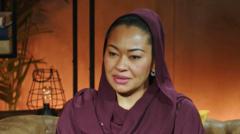A Nigerian senator has sparked a storm of controversy by describing the Senate as operating like a "cult" following her suspension amid allegations of sexual harassment against Senate President Godswill Akpabio. Natasha Akpoti-Uduaghan, representing the opposition Peoples Democratic Party (PDP), made her remarks during a recent interview, expressing concern for her safety after losing her security detail post-suspension.
Akpoti-Uduaghan was suspended for six months after submitting a petition detailing her harassment claims against Akpabio, which he vehemently denies. She asserts that her punishment for bringing these allegations to light reflects a broader culture of silencing dissent within the Senate. “The Senate president runs the Senate like a dictator, not a democrat,” she stated, criticizing the lack of freedom of expression.
Her initial accusation stems from a visit to Akpabio's country home in 2023, where she claims he made unsolicited, suggestive remarks. She further alleges that the harassment escalated over several months. However, Akpabio's office dismissed her allegations as completely false while asserting that Akpoti-Uduaghan's legislative track record contradicts her claims of being silenced.
With only four female senators out of 109 total members in Nigeria's parliament, the situation has drawn significant attention, especially as civil rights groups call for a thorough investigation into her allegations. “Today is a sad day for Nigerian women fighting for emancipation,” lamented women’s rights activist Hadiza Ado in the wake of Akpoti-Uduaghan's suspension.
Despite receiving mixed reactions, including support from various social media communities, Akpoti-Uduaghan described experiencing misogynistic harassment online since her allegations. Protests erupted in Abuja, with supporters of both Akpabio and Akpoti-Uduaghan demonstrating outside the parliament.
Akpoti-Uduaghan has faced a tumultuous political journey, having previously run for governor with accusations of discrimination against her mixed-race heritage and suffering various forms of intimidation. She remains determined to reignite her allegations and overturn her suspension through legal means, supported by encouragement from her family and a growing network of women speaking out about their own experiences of harassment and inequality in politics. “This is my story and my story is that of many women in Nigeria who do not have the courage to speak up,” she said, reflecting the wider struggle for female representation in Nigerian politics.




















